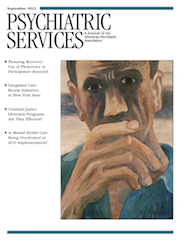Financial Victimization of Adults With Severe Mental Illness
Abstract
Objective
People with severe mental illness are vulnerable to having other people directly take or misappropriate their disability payments. This study investigated the prevalence of different types of financial victimization and the client characteristics associated with being financially victimized.
Methods
Adults (N=122) receiving inpatient or intensive outpatient psychiatric treatment who received Social Security disability payments completed assessments about money management and victimization. A path model was used to estimate the association of victimization with participant characteristics.
Results
Seventy percent of participants experienced at least one type of financial victimization in the preceding 28 days; 35% ran out of money because of victimization. Victimization was significantly associated with being younger, having had more psychiatric hospitalizations, having more recent alcohol use, and, most robustly, having problems managing money (β=.52, p<.01).
Conclusions
Financial victimization of disability recipients in acute care settings is common and more likely among people with recent substance use and difficulty managing their funds.



